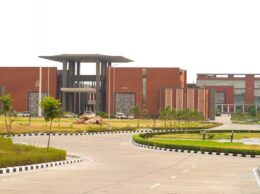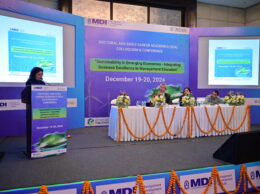New Delhi: Skills are transforming. Education ecosystem is changing.The learning process is evolving. Amid this environment, SkillOutlook has an email-based interaction with Mr. Siddharth Maheshwari, Director, Amity Future Academy. Here are the briefs on the interaction.
- Growing demand of skill – based learning and what Education 4.0 offers to fulfil the same
Education 4.0 is more about personalization of the learning process. For the enhancement of students, new age universities are adopting new technologies, innovative teaching methods, online content delivery, use of LMS and ERP solutions and blended learning models for personalized and adaptive learning experience.
Easy accessibility of open educational resources.
- Faculties, industry trainers and experts are sharing their pool of knowledge with everyone in the form of video, audio, learning materials etc.
Blended Learning Experience
- Owing to the modern trend, educational institutions are adapting the combination of online educational materials along with traditional classrooms.
Change in student assessment methods
- Working with large data sets is easier than ever. Universities are maintaining detailed assessment database which is accessible to both teachers and students thus giving a freedom to students to create their own learning curve.
Rise of automation
- Automation has changed the way of not just in onboarding new students, accessing school resources but has augmented the student and faculty engagement. This will continue to simplify and streamline the processes in future as well.
Provision of degrees off- shore
Gamification
- Demand – supply gap in Indian higher education – what solutions could plug this gap
Considering the importance of educational technologies for higher education, the emphasis should be given to meet the expanding future student demand along with improving the learning experience.
Following things can be done to bridge the gap:
a) Enabling students with skills related to employability and job creation, entrepreneurship and enterprise skills.
b) Early stage research and development experience
c) International exposure at undergraduate level to provide a wider word-view.
3.What is the positioning of Amity Future Academy?
Amity Future Academy is positioned to offer programs for skilling for fresh graduates and young professionals and re-skilling for existing workforce with a common mission of creating careers of tomorrow through extensive and engaging learning experience.
4.Skills are more important than degree, why?
From the past few years there has been a drastic change in the job market scenario, and it is going to continue for another decade. With the growth of technology and digitization, jobs are getting highly specialized and automated. Consequently, there is a learning gap that needs to be addressed by the educational sector. Skilling employees/individuals is important not just to keep up with the technological trends, but also to stay ahead of the competition.
According to the Talent Shortage Survey 2017, conducted by the Manpower Group, 40 percent of employers worldwide reported lack of skilled, qualified workers with the necessary skills to fill open positions. This clearly shows us that upskilling is the need of the hour and demonstrates a massive skill-gap in today’s workforce. As per very powerful data above and an experienced eye on corporate-academia, Amity Future Academy was formed to build careers of tomorrow in new age economy.
- What impact will upskilling create on students and employees?
Automation is responsible for rendering jobs redundant in the IT sector as machines replace humans in many jobs. The IT industry, which once drew employees in large numbers, has suffered from large-scale layoffs recently, which have made it volatile. Upskilling is the only way to stay abreast with new methods and remain relevant.
With upskilling and re-skilling, students & employees undoubtedly improve their employability and avoid redundancy. Learning new skills also quickly helps them to adapt to the changing needs of the business and opens up new avenues for career enhancement. Eventually, all this leads to a better, rich and fulfilling career which significantly impacts not only their lives but also the lives of people who are dependent on them – family, parents, etc.
Democratizing education for all does not just yield personal growth of learners, & it holistically Leads to a better economic world as GDP of a nation is very highly dependent of skills its’ Workforce possesses which by far has been reflected in policies of many nations today.
- How India is embracing for the skills of the future?
While India is projected to have 42 million higher education graduates by 2020 (Source: Ernst & Young), the tertiary-aged population in India will rise to over 119 million in 2024, the largest in the world. (Source: Times Higher Education). However, there remains a massive demand-supply gap in Indian higher education. By 2022, India will face a potential shortage of 250 million skilled workers across sectors. (Source: UKIBC; Ernst & Young). According to Accenture’s Future Workforce Study, only 20 percent Indian leaders believe their workforce has the required skills to work with emerging technology. The vast majority of professionals expressed the need for training, with 93 percent saying it will be important to learn new skills if they are to work with intelligent technologies in the next three to five years.
We have emerged from the times when students were required to reside in the Gurukul to serve their teachers and obey their duties with no set curriculum. Education that once focused on one-to many is now gradually transforming its way of delivery by providing various broad learning opportunities to students. Artificial Intelligence is changing the way students used to take assessments. Digital experiential learning and micro-credentials is making its way ranging from online degrees and coding boot camps, to technology certificates, digital badges and Nano degrees. Internet of Things (IOT) is influencing education by helping institutions making informed decisions. Education now largely emphasizes on “the way it is taught” by aligning with future trends thus making the current generation- Leaders and Learners of Tomorrow.









